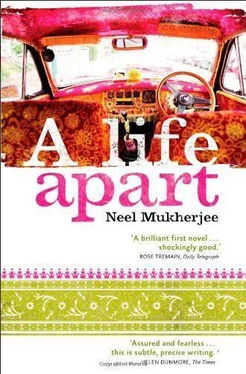‘Oh, yes, he has, thank you. He’s very eager to please.’
‘You mustn’t attach too much importance to him. I retain him out of old loyalties but he’s really very’ — a ticking pause, one two three four five six — ‘peripheral.’
Ritwik makes an effort to ignore the last word; he counts twenty backwards and then asks, ‘What old loyalties?’
Zafar doesn’t bother to respond. Instead, he says, ‘We’re in Streatham already. That was quick, wasn’t it?’
‘Thank you for dropping me off.’ The armour had parted, only a tiny bit, for a tiny fraction of time; it has become impenetrable again.
‘I’m off to Gloucestershire in a couple of days’ time. For a night, maybe two. I was going to ask you to come with me but I know you can’t.’
‘Oh. What’s happening in Gloucestershire?’
‘Business stuff, meetings, prospective clients. Work.’
Only after Ritwik has shut the passenger door and Zafar has made a three-point turn to leave Ganymede Road does Ritwik notice the open curtains and the lights blazing in the living room. He lets himself in. Every single light in the house seems to be on.
‘Anne, Anne,’ he calls out.
There is no answer. That is not unusual but something about all these burning lights makes his blood pound hard in his heart, his ears. He runs into the kitchen and notices that the door to the garden is wide open. He rushes out but his pupils take a few seconds to adjust to the dark outside. He sees a pale shape, not even a ghost but the residue of one, under the horse chestnut. He advances with immense strides.
Anne is standing under the tree, her nightdress clinging to the bones of her frame. She has one hand cupped behind an ear, as if she is trying to focus on some very distant sound, and a finger on her lip asking for total silence. Regardless of the fright he has had, that gesture overwhelms everything else: he doesn’t speak and listens out for what Anne might have heard.
After several moments of this silence, Anne whispers, ‘Listen.’
A minute of waiting then the silence of the cold spring night shatters with manic laughter from up high, an eked out cackle and bray that curdles his blood. It is followed by another, then another, and Ritwik realizes with a flash that it is the call of an animal.
Anne hobbles closer to Ritwik and whispers in his ear, ‘Kookaburras. A pair of them.’
They stay rooted under the tree, Ritwik suspended in a miracle he neither comprehends nor welcomes. After an eternity, he touches Anne’s arm and steers her towards the house. He doesn’t think they’ll hear the birds again.
Anne witters on, ‘ Dacelo gigas . It’s one of the largest members of the Alcedinae, the kingfisher family. Alcedinae. The family name must be from the story of Alcyone, don’t you think? Do you know the story of Ceyx and Alcyone, how one of them went to sea and was lost, and bereft of her love. .’
On one of these nights of unrest outside and swelling anxiety inside, when she cannot sleep, Miss Gilby writes a short note to her brother, asking him for any information he might be able to glean from his wide range of acquaintances on Ruth Fairweather, but avoids mentioning what is happening in Bengal; chances are, he has a far greater, if removed, familiarity with these developments. She writes a longer letter to Violet apprising her of everything — Bimala’s infidelity, her own growing interest in Indian birds, the tension caused by Mr Banerjea’s presence in ‘Dighi Bari’, the village poised on the knife edge of communal riots. By the time she finishes, the dawn chorus has begun. She puts on her riding attire and decides to take Pakshiraj out without waking up the saees : a long ride, she thinks, will blow the cobwebs away from the increasingly dark and cluttered corners of her mind.
She reaches the paddy fields and directs Pakshiraj towards the Tulsi river, now a thin, bright ribbon in the winter, with large stretches of sandflats and wet riverbed around it crisscrossed by meandering, silvery threads of water. The morning breaks all pale gold and orange and before long settles into the white light of day. She has become a stranger in a family of strangers. The only person with whom she can converse is so busy and harried that she hasn’t seen him for weeks, except that brief meeting in the verandah; even at a time like this, his natural courtesy reminded him, first and foremost, to be solicitous of her welfare and safety. The very thought makes Miss Gilby’s eyes sting with tears. How noble and unselfish, how manly; such men are forever doomed to bear the slings and arrows of fortune with silent patience and grace. The haggard look, those lacklustre eyes, which were wont to shine with gentleness and warmth — could they be not only for the fires raging in his village? Could he have an inkling of what is going on between his wife and his closest friend, no, no friend, but a viper, right inside his very house? Does he know the full story? Has he let Bimala know that he knows? Or does he know and suffer in silence, like King Arthur in the tale by Malory? Miss Gilby had been taken by surprise when she had reached the end of the story to find out that the aged King had known of his wife Guinevere’s adulterous relationship with Sir Lancelot for long but had kept quiet in the interest of the unity of the Round Table. A sudden memory gives this view the seal of certainty in Miss Gilby’s mind: she remembers the anguished whisper of Mr Roy Chowdhury — I cannot send my friend away, Miss Gilby, I cannot — when she had asked him why he didn’t arrange for Mr Banerjea to leave Nawabgunj and go away to Rungpoor, something he had been meaning to do for a long time.
Or was it some native code of honour, of loyalty to friends, which she doesn’t comprehend at all, some time-honoured custom sanctioned by centuries of practice by people of this unreadable nation? So preoccupied is she with these unwholesome thoughts that she misses the track looping back to the village. She stops for a while to reorient herself and instead of turning back, presses forward and then turns right at a field; she is sure if she continues down that road it will take her downriver to the village.
She is not wrong. A few minutes later she notices a few men and has a mild sensation of relief that she is nearing Nawabgunj. She reaches the rail tracks, crosses it and continues south: she must be somewhere in between Nawabgunj and its north-neighbouring village, the name of which she cannot remember. The place looks slightly more inhabited than the open country through which she had been riding earlier. She gets off her horse and decides to walk to the nearest gathering of people and ask for directions.
Suddenly her back is hit by something hard and heavy. She turns around, letting go of Pakshiraj’s reins. There are four men a few yards behind her. Two of them have lathi s in their hand and one of them is bending down to pick up another stone. Miss Gilby is so sure that a stone has been hurled at her in mistake or by accident that she advances towards them to complain and ask them to be more careful. Before she has taken half a dozen steps, the young man who had been picking up a broken brick flings it at her, his arm moving back and then forward in a sweeping arc. It misses Miss Gilby narrowly but she is no longer left in doubt that she is their target; she is also certain they have been following her for some time. Pakshiraj takes fright at the flung brick and runs away across the field, neighing. Miss Gilby cannot mount him and gallop away to safety or to the nearest police station — she is left to face them alone.
As the distance between her and the assailants decreases, she recognizes two of the young men. She used to see them often in the market square; they smiled and wished this exotic foreigner in their village ‘Good morning, memsa’ab ’, ‘Good evening, memsa’ab ’ every time they saw her. This is some terrible mistake, she thinks; if only she can talk to the two familiar men, everything will be all right. They will understand and go away to summon help. The men exchange a couple of words, another stone is thrown. This hits her forehead and she sinks down on to the muddy field on her knees, clutching her head in pain and shock. A warm trickle gets into her left eye, blinding it momentarily. She didn’t know that her own blood could blind and sting her eyes.
Читать дальше












